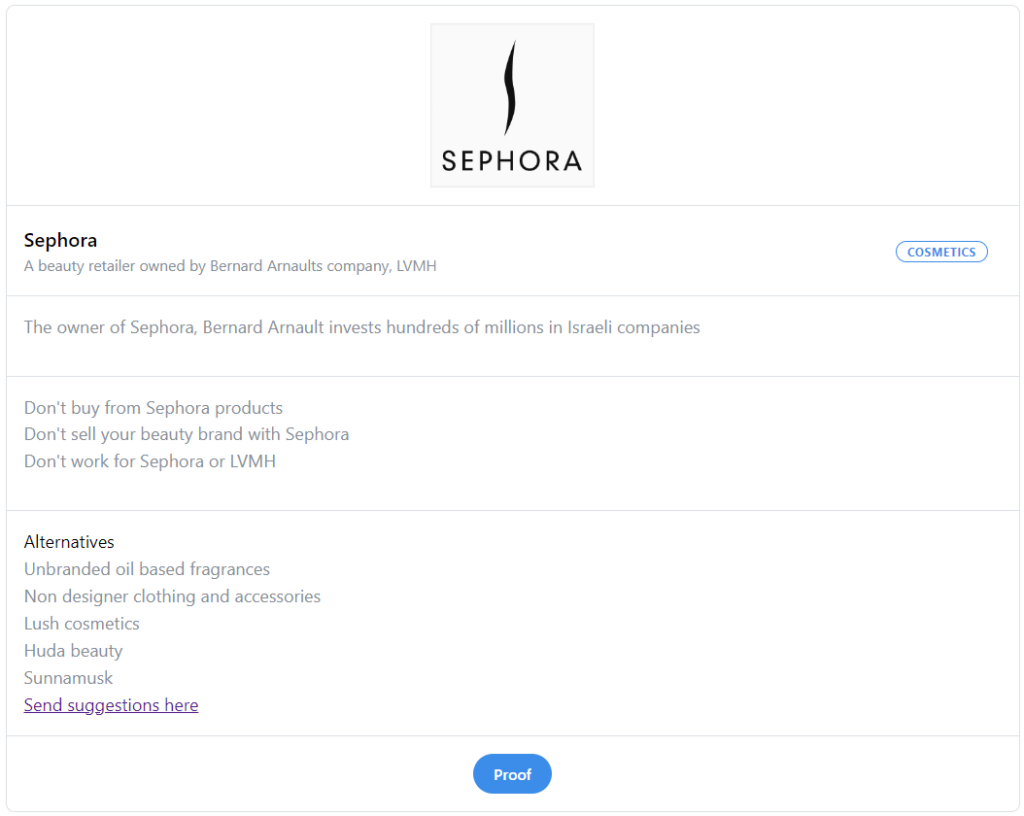In a world where consumer choices often echo louder than words, the beauty industry’s ethical landscape has come under scrutiny. The connection between makeup brands and their ties to the Israeli occupation in Palestine has ignited a global conversation about conscientious consumerism.
Sephora, a prominent luxury beauty retailer, faces mounting criticism and legal action due to its affiliations, prompting calls for a boycott among those advocating for Palestinian rights and human rights organizations.

Check Out: Is Starbucks Funding Israel? Explained
Daftar isi:
The Call for Boycott
Consumers advocating for Palestinian rights and human rights associations have initiated legal action against Sephora. The association CAPJPO EuroPalestine has taken legal steps in France, challenging Sephora’s business dealings with Ahava products. These products, manufactured in the Palestinian West Bank’s kibbutz Mitzpe Shalem, near the Dead Sea, are deemed to originate from an “illegal settlement” by the association. In the eyes of international law, Israeli colonization is considered a “war crime.” Therefore, the association asserts that the distribution and sale of Ahava products in French stores are unlawful. They are demanding the annulment of the distribution agreement between Sephora and Ahava, along with financial compensation for damages.
The movement extends beyond legal proceedings. Demonstrations, like the one organized at the Sephora outlet in the Musée du Louvre mall in Paris, serve as a visible expression of dissent against Sephora’s business practices linked to the Israeli occupation.
Alternatives
For conscientious consumers seeking alternatives, various options exist. Embracing unbranded oil-based fragrances, non-designer clothing and accessories, or exploring ethical beauty brands like Lush Cosmetics and Huda Beauty offers avenues to align personal values with consumer choices.
Explore More: Boycott Makeup Brands Backing Israeli Occupation in Palestine

The uproar against makeup brands involved in the Israeli occupation highlights a significant shift in consumer behavior—one that aligns personal values with purchasing decisions. The outcry against Sephora underscores the growing impact of ethical considerations in the beauty industry.
As consumers increasingly leverage their power to influence corporate practices, this movement sets a precedent for a more socially conscious future in consumerism, emphasizing the pivotal role individuals play in shaping ethical standards within the beauty landscape.
- Investigating Ferrero Rocher’s Support and Investment Stance on Israel
Does Ferrero Rocher support the Israeli Occupation of Palestine? The scrutiny surrounding the company’s supposed support is growing, particularly for…
- Exploring ASDA’s Interest and Support in Israel
Does ASDA support Israel by selling products sourced from Israeli settlements in Palestine? This raises concerns over human rights violations…
- Does Hershey Support Israel? A Deep Dive
Amid allegations of ties to Israel and Palestinian territories, Hershey faces controversy. Let’s delve into the upheaval, analyzing accusations, investigating…
- Luxury Companies Supporting Israel: A Deep Dive into Their Possible Connections
Are luxury companies, such as LVMH with its notable brands Hublot, TAG Heuer, and Tiffany & Co, supporting Israeli companies?…
